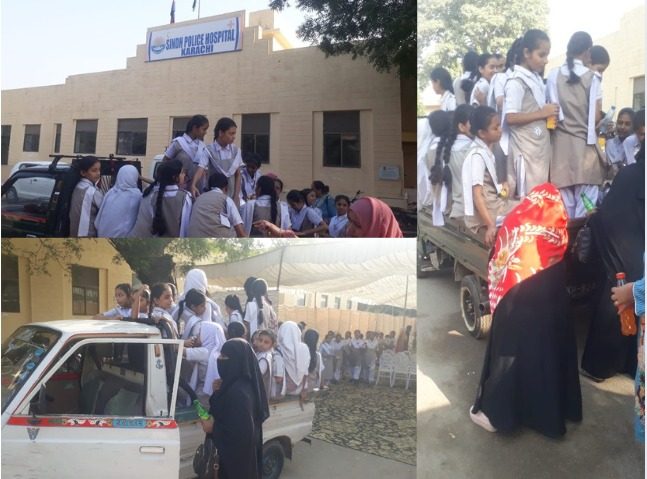Students from government schools were transported to the venue in open Suzuki pickups, reportedly crammed together in unsafe conditions

By our correspondent
KARACHI: To revitalize polio eradication efforts, the Sindh Emergency Operation Centre (EOC) launched a new initiative, Big Catch-Up, on Tuesday morning at Karachi’s Police Hospital, hailing as the invention of EOC Sindh Coordinator Irshad Ali Sodhar, a “Polio Scientist.” The Big Catch-Up campaign has sparked significant controversy, with critics alleging glaring safety lapses and ineffective management.
Sindh Health Minister Dr. Azra Fazal Pechuho attended the inauguration, which was marred by questionable logistical decisions. To bolster attendance, students from government schools were transported to the venue in open Suzuki pickups, reportedly crammed together in unsafe conditions. Fortunately, no accidents were reported, the incident raised alarm over the government’s disregard for the children’s safety as observers pointed out that such transportation methods were not only unsafe but also demeaning, likening them to the treatment of livestock.
According to the sources, the UNICEF-funded program, meant to showcase progress in polio eradication, fell short of addressing the core issues plaguing the campaign. Following the event, Irshad Sodhar, the “Polio Scientist,” left the premises promptly in his government’s luxurious transport, leaving the children to find their way back to their schools in the same unsafe vehicles without adequate oversight. It is pertinent to mention that in the previous campaign in Balochistan despite adequate security unfortunate incident happened and leaving the children without safety after the event was quite unprofessional attitude.
Criticism of Sindh’s polio program extends beyond logistical concerns. Reports suggest that nearly 2.4 million children in Sindh miss out on polio vaccinations, despite funding allocated for approximately 18 million children. Experts argue that the gap highlights systemic inefficiencies and raises serious questions about the utilization of funds.
This is not the first time EOC has faced scrutiny. Previous initiatives, such as the appointment of school students as “Polio Ambassadors,” have been criticized as ineffective, with little to show for the resources invested. Critics allege that the Sindh government prioritizes optics and political maneuvering over meaningful action, as evidenced by their efforts to involve high-profile officials in such events while failing to address ground-level challenges.
The presence of Sindh’s health minister at the event, juxtaposed with the unsafe transportation of schoolchildren, underscores the need for stricter oversight and accountability. Experts emphasize that the safety and dignity of children must be prioritized, urging the government to take immediate action to prevent such lapses in the future. While polio remains a critical public health challenge in Pakistan, Sindh’s inability to address these systemic issues threatens to undermine eradication efforts.
Ensuring transparency, ethical governance, and a child-centered approach will be crucial for restoring public trust and making tangible progress in the fight against polio. Adding to the internal controversy, allegations of sexual harassment within the polio program have emerged, with reports of inappropriate use of office spaces by senior official for using their personal pleasure in District Keamari. Such incidents cast further doubt on the integrity of the program’s leadership and ability to achieve its goals.



